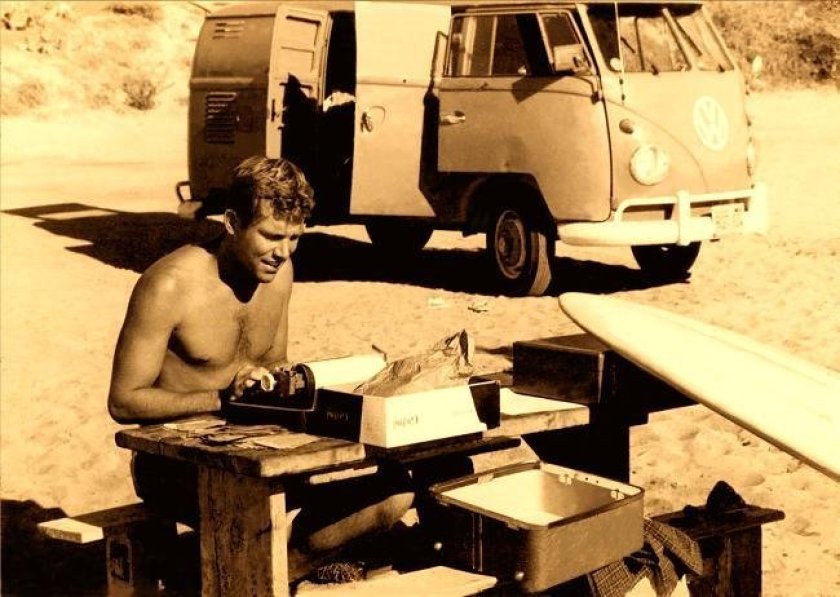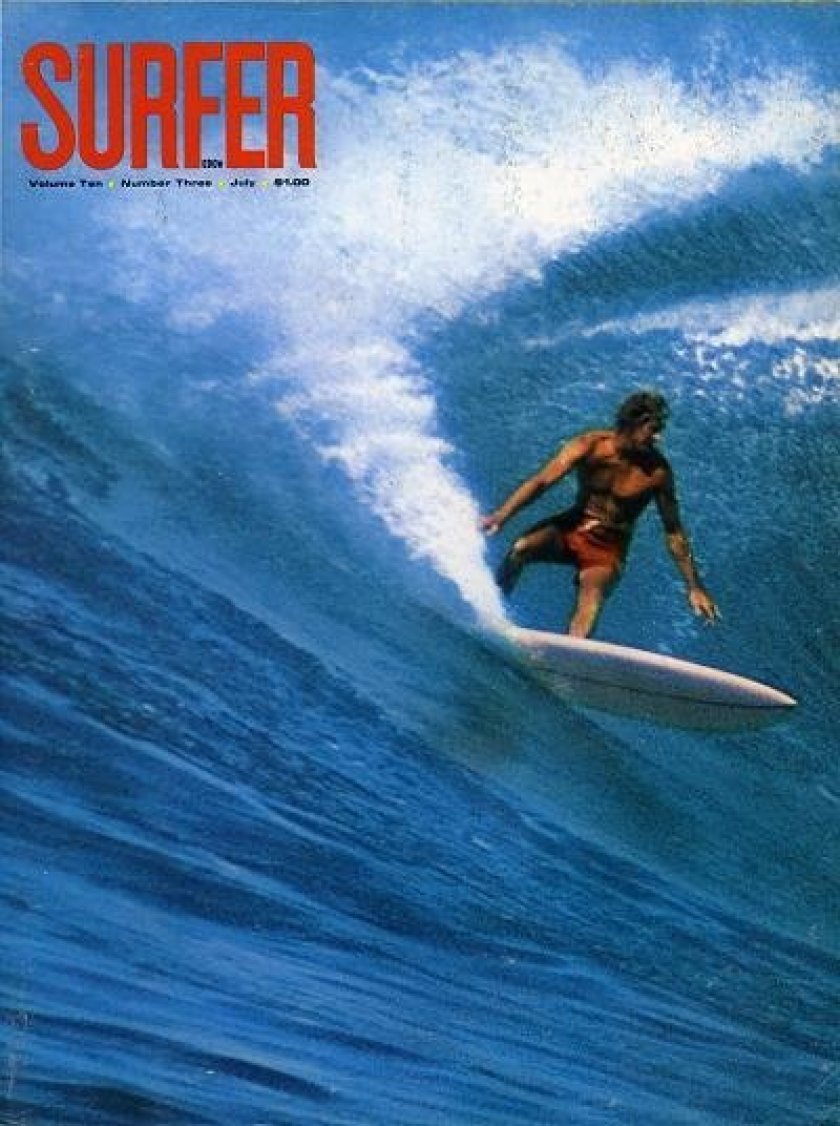Surfer magazine, which helped legitimize wave-riding as a global sport through its lush photography and California-cool stories, printed its final edition and suspended operations this month, to the dismay of the legions of baby boomers who once lingered at newsstands waiting for the latest issue.
Founded in 1960 and beloved by pre-internet-age surfers from Mission Beach to Biarritz, the magazine furloughed staff Friday and ceased further print and online content offerings. Though founded in Orange County, the magazine was based in recent years in Carlsbad.
“The whole staff got let go yesterday (no, nothing to do with the heat from the Biden endorsement, just the COVID economy), but I feel like we’re ending on a high note with this one,” Editor in Chief Todd Prodanovich said in an Instagram post about the final issue.
“Funny how you can work a job like this for 10 years and each issue is a completely new and different journey. I’ll really miss that part, and the mag in general, which ends on this issue after 60 years of publication.”
Though many in the surfing community say they saw the end coming, the demise of Surfer still stings for aging surfers who couldn’t wait for the monthly magazine to arrive.
“I have watched many great publications go out of business over the past few years, but this one hit me really hard,” said Steve Hawk, who edited the magazine for eight years in the 1990s. “It was so much more than just a magazine for a lot of surfers of a certain generation. It was a cultural touchstone and groundbreaking in a lot of ways.”
Surfer was among the first niche sports magazines of any kind to be successful, with a pedigree akin to Hot Rod and Field & Stream, Hawk said.

John Severson started Surfer magazine with a single issue in 1960.
(Family photo)
It helped spawn a plethora of beach culture publications such as Surfing, which closed about three years ago, and the ongoing magazines Surfer’s Journal in the U.S. and Surfing World in Australia.
“It was the first. It became the communications vehicle for surf culture, and out of that came other ones,” said Peter Townend, a legendary surfer and president of ActivEmpire, an industry consulting firm. “We have suddenly lost one of the most iconic brands in the surf culture over the past 60 years.”
Known as the “bible of the sport,” Surfer probably reached its peak in the early 2000s. Like many print periodicals, it struggled to get a grip on the digital advertising business model as more and more of its readership transitioned online.
“There was a real magazine and print mentality among the editorial staff that said, ‘Look man, this is Surfer magazine. This thing is never going away,’” said Scott Bass, who worked in digital operations at Surfer from 1997 to 2007. “No one wanted to admit it.”
After a series of ownership changes, Surfer was acquired in 2019 by American Media Inc., which owned the National Enquirer.
AMI has since merged with another company and has been renamed A360 Media. It publishes a handful of other magazines, including Men’s Journal, Muscle & Fitness, Star, In Touch, US Weekly and Soap Opera Digest.
When AMI bought Surfer, it also acquired sister publications Bike, Snowboarder, Powder and Transworld Skateboarding. Some of these publications also have been reportedly affected by furloughs and suspended operations.
In an emailed response to questions, a spokesman for A360 Media said that “due to pandemic’s economic impact on the industry and the cancellation of live events, staff furloughs and the suspension of operations for some brands are necessary for the time being.”
Bass, executive director of the Boardroom surfboard show in Del Mar and a longtime industry executive, recalled that the first issue of the magazine contained a photo of a surfer paddling out toward a glassy pristine wave. It became a signature of what the magazine was about.
“That kind of set the bar for this ideal of going out and finding your own little slice of heaven,” Bass said. “Searching for that, this idea of adventure, of freedom, of individuality, of being different, a little bit of counterculture, all of those things. That is what Surfer magazine was draped in. It was very important.”
John Severson, an art teacher, photographer, writer and cartoonist, founded Surfer magazine to promote a new surf film, said Steve Pezman, who worked at the magazine for 20 years before founding the Surfer’s Journal. The artistry of the magazine captured readers’ imaginations, he said.
“Surfing is sort of the artful relationship between humans and the ocean,” he said. “So all the photos and stuff about surfboards, all of it has an art factor to it that gives it a level of being that goes beyond most topical magazines.”
The quality of the articles also brought in loyal readers. “Writing about surfing tends to become unintentionally philosophical because waves come and go, but they represent benchmarks to your skill and your life,” Pezman said. “People write about them in a special way.”
The magazine’s end has sparked nostalgia among its many readers over the years, particularly for those in the pre-Instagram, pre-YouTube generations.

John Severson realized that surfers would devour any image of a wave or a surfer. So why not do a magazine filled with surf photos?
(San Diego Union-Tribune)
“Surfer was the bible when I started surfing in 1977 in Imperial Beach at the age of 13,” the town’s mayor, Serge Dedina, said. “Every page was scrutinized repeatedly. I subscribed in 1978. I still have all my issues.
“Surfer printed my letter to the editor about the proposed Imperial Beach breakwater project back in 1980 (stopping that project was the first victory for the Surfrider Foundation) as the President of the Mar Vista High School Surf Club,” Dedina continued. “The seminal articles by Craig Naughton and Kevin Peterson influenced me to become a surf adventurer starting in high school and college. I will miss Surfer and always be thankful for its outward-looking focus on exploring the world, being a global ambassador for surfing, protecting the coast ocean, and pursuing lifelong ocean stoke.”
Townend, the ActivEmpire president, wonders where young surfers will turn for inspiration today without publications like Surfer.
“Last week, there was great hurricane surf on the East Coast. There were pictures on social media. But they were there and gone,” he said. “Surfer magazine had permanence. You’d rip out its pictures and pin them to a wall. Today’s groms don’t have that.”
Freeman and Robbins write for the San Diego Union-Tribune.





Recent Comments